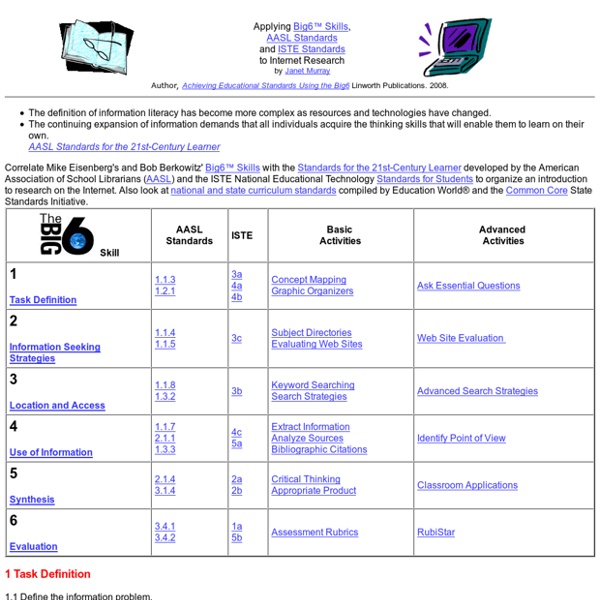Big6 Process Model
The Big6™ is a process model for information problem-solving. It integrates information search and use skills along with technology tools in a systematic process to find, use, apply, and evaluate information for specific needs and tasks. The Big6 was developed by Mike Eisenberg and Bob Berkowitz and is the most widely known and widely used approach to teaching information and technology skills in the world. It is used in thousands of K-12 schools, higher education institutions, and corporate and adult training programs and is applicable whenever people need and use information (source: The Big6 model has been adopted at the Dubai Women's College and is part of the curriculum. Here is a summary of the information literacy experience using the Big6 model as a framework: Reference Documents - Step 1 Articles © Linworth Publishing, Inc Reference Documents - Step 2 Reference Documents - Step 3 Reference Documents - Step 4
NYPL | Blog: Library Voices
by Anne Rouyer. Supervising Librarian PSSSTT! Let me let you in on a little librarian research secret: finding information at branches and online isn't hard (anyone can do it). In fact, in this digital age of online databases, Google and Wikipedia we are on information overload. We are surrounded by too much information actually. Well, we know how to evaluate information, dissect it, analyze it, reassemble it and put it to use effectively. "The Big6 Skills" process isn't a shortcut. Step 1: Defining the Assignment or Project What is it exactly your teacher wants from you? Step 2: Research Strategizing and Planning Now that you understand the assignment, have chosen your topic and written down what you need to find out, you must decide how to go about finding the information you need. One key to good research are good keywords. Tip: An online library database is always preferable to a Googled website. *A quick word on Wikipedia. Step 3: Location, Location, Location Step 6: Assessment
Big 6 Resources - UEN
2. Information Seeking Strategies Determine the range of possible sources (brainstorm) This means that you need to make a list of all the possible sources of information that will help you answer the questions you wrote in Task Definition. Consider library books, encyclopedias, and web sites to which your library subscribes (ask your librarian!) Evaluate the different possible sources to determine priorities (select the best sources) Now, look carefully at your list. by: Barbara A. Information Seeking Strategies Lesson Plans Step Zero: What to Do Before Searching A method for determining keywords and setting up successful Internet searches. Graphic Organizer for Information Seeking Strategies Clustering: Use to generate ideas about possible sources of information. Online Resources The "Big6™" is copyright © (1987) Michael B.
Big6 Information and Technology Skills: Essential and Relevant
Presented by Dr. Mike Eisenberg, Professor and Dean Emeritus, University of Washington’s Information School Sponsored by Libraries Unlimited If you attended the live session, you’ll be emailed a CE certificate within 24 hours of the webinar. If you view the recording and would like a CE certificate, join the SLC @ The Forefront community and go to the Webinar Archives folder to take the CE quiz. Is information literacy learning (and the Big6) passé? Last time we checked, this is still the information age and students are facing even more challenging information problems than ever. Well-known educator and visionary Mike Eisenberg presented a content-packed webinar that emphasized practical strategies for defining and delivering a relevant and meaningful information and technology skills instructional program. Dr.
Researching with the Big 6! Model - Home
The Big Reveal - Libraries Transform, But Only with Expert Librarians
By Sara Kelly Johns, Susan D. Ballard, and Dorcas Hand The ALA Initiative “Libraries Transform” has been further defined during this past year by ALA President Julie Todaro as “Libraries Transform: The Expert in the Library.” This is because of the recognition that the professional is the key ingredient to ensure library success; and the same is true for school libraries. In developing her initiative, Julie tapped the three of us to join her task force and chair the school group, and we in turn tapped a group of respected practitioners to build a set of resources to define and support the professional growth of school librarians. Our team’s initial work involved searching for articles and AASL position statements to define Dispositions and Competencies for effective practice, Leadership and Collaboration to strengthen impact, Value and Measurables to offer administrators and policy makers, and Advocacy tips to benefit community awareness. Like this: Like Loading...
TheBig6.org
Standards for the 21st-Century Learner
Skip to main content ALA User Menu A Division of the American Library Association You are at: ALA.org » AASL » Learning Standards & Program Guidelines » Standards for the 21st-Century Learner Share this page: Share on Facebook Share on Google+ Share on Pinterest Print Standards for the 21st-Century Learner Standards for the 21st-Century Learner offer vision for teaching and learning to both guide and beckon our profession as education leaders. Rights and permission on the use of the learning standards. Downloading & Ordering You can download the Learning Standards as an eight-page full-color pamphlet: You can also purchase the learning standards in packets of 12 from the ALA Online Store. Prices are $13.50 for members; $14.95 for non-members. *This publication complements the Standards for the 21st-Century Learner in Action and Empowering Learners: Guidelines for School Library Programs. © 1996–2017 American Library Association



